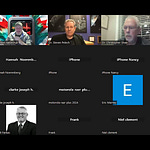Transcription:
SPEAKER 4
So in a couple of weeks from now to mark the day of fools, your life's going to get a lot more expensive through the 23% increase in carbon tax, which works out to be about 17 cents a liter in just your fuel.
Now the premiers of almost all the provinces, seven out of 10 of them have actually stood up to send Justin Trudeau a letter asking for a pause on the tax.
And who you're not going to see on this list is BC Premier David Eby.
He said that even if Trudeau didn't raise the tax, he was going to anyways.
Pretty committed fellow, that guy.
You're also not going to see Quebec, because as I understand it, they have a different deal going on with the federal government, and they wouldn't have seen the raise anyways.
And then there's Winnipeg or Manitoba, WAB canoe.
And in January, WAB actually had a lot of words to say about the carbon tax that he's not seemingly to say right now.
SPEAKER 2
When you're talking about cutting the fuel tax, would you like to see the federal carbon tax exemption extended to Manitobans?
SPEAKER 1
I think that there's an argument that Manitoba is maybe one of the strongest cases you could make that the price on carbon should be revisited in our jurisdiction.
And so, you know, that's something that I'd like to work on.
SPEAKER 4
And it's definitely something that I know Manitobans would like to see some help with.
I'll save you from the rest of his chatter.
I mean, he just mutters on about we've made some big investments and blah, blah, blah.
And
Net zero and blah, blah, blah.
So even inside of what he was just saying there, you know, Manitobans would like to see some help with this.
He's not going ahead with it now.
See, something happened between January when he came up with this statement and right now.
That's right, Clown Prince paid him a visit.
They had a talk about a few things and Wab Canoe doesn't think that Manitobans deserve a break on their carbon taxes anymore.
Now, it's been a few weeks since the House of Commons has opened up and had question period.
Of course, with a couple of weeks left remaining until this tax goes through, Polyev had quite a few words for the liberals on their carbon tax as well.
While common sense conservatives are fighting to axe the tax bill, the homes, fix the budget and stop the crime, this Prime Minister is promising a cruel April Fool's Day joke.
A 23% carbon tax hike on food, gas and groceries.
This at a time when the Prime Minister has forced 50 families at CFB in Gagetown, military families, to go to food banks.
Two million Canadians every month going to those same food banks.
8,000 as part of a Facebook group where they share tips on eating out of dumpsters.
Will the Prime Minister gain some compassion and some common sense and spike the hike?
SPEAKER 3
The Honourable Deputy Prime Minister and Minister of Finance.
Mr. Speaker, we will take no lessons from the Conservatives when it comes to supporting the least vulnerable in our country.
This is the party that wants to cut the Canada child benefit.
This is the party that wants to cut support to our seniors.
This is the party that wants to cut early learning and child care, which supports so many families.
They're opposed to dental care.
They're opposed to pharma care, Mr. Speaker.
SPEAKER 4
The Honourable Leader of the Opposition.
Fear and falsehoods to distract from the fact that after eight years of this Prime Minister, he's not worth the cost, and neither is his carbon tax, which will cost the average Ontario family this coming year $1,674.
$1,674 for a middle-class family that's lined up at a food bank, not able to feed themselves or pay their heating bill.
Will the Prime Minister give his head a shake, cancel his cruel April Fool's Day joke, and spike the hike?
SPEAKER 1
The Honourable Deputy Prime Minister and Minister of Finance.
SPEAKER 3
Mr. Speaker, no one here is surprised to hear the Conservative leader talk about fear and falsehoods because that is what he traffics in every single day.
It's his area of personal
Now, what he is proposing is, at least he is consistent.
He wants to cut, cut, cut the support that Canadians get, and he wants to cut the support Canadian families are getting from the price on pollution.
That's $1,800 Alberta families won't get.
That's $1,120 Ontario families won't get.
Cut, cut, cut.
All they know how to do.
SPEAKER 1
The Honourable Leader of the Opposition.
SPEAKER 4
So she just brags that Alberta families will get $1,800, but according to the parliamentary budget officer, the carbon tax will cost Alberta families $2,943.
amazing so she take the prime minister takes away twenty nine hundred and forty three dollars and gives back eighteen hundred dollars madam mr speaker it's almost like he's a bank robber who thinks that he's virtuous because he tips the teller on the way out the door why won't he spike the hike now there's actually some pretty shocking and troubling numbers inside of what we just heard there
I mean, we knew that there was 11 million people that had received that food rebate last year.
We know that there was 2 million people hitting the food banks per month.
The 50 military families in Gagetown that are needing food bank support is pretty troubling.
But the fact that there's a Facebook group where there's over 8,000 members talking about how to prepare food out of dumpsters,
I mean, you know, is that the people that are in the tent cities?
Like, I don't know.
And aren't these the most vulnerable people that Freeland should be worried about?
The people that they put out of their homes?
People that are on the streets?
I mean, it's insanity.
So a couple of other things that were brought up there is the actual net cost to Canadians.
So Freeland goes on about how this is a zero net revenue program.
proposal that's put out by the government and in fact cost of administration is is is quite steep i mean it's just basically a creation of bureaucratic jobs um but when they go off and and spout about eight out of ten canadians being better off and then you hear the actual numbers twenty nine hundred and forty three dollars are paid out by albertans through the scam
estimated and 1800 back now that doesn't sound like a net neutral no revenue to government of canada type program that's 1100 bucks i mean families are paying an additional 245 dollars per month to get a small rebate quarterly now where's the difference in this you see
When they had a look at what the average family is paying or when the liberals say you're getting back more than what you put in, they're not counting on the periphery of how far this actually reaches.
So when you take into account that stores have to pay for transport of goods and heating, lights, cooling in the summertime, when you take into the fact that farmers will pay the additional on their production, manufacturing, on just maintaining their farms, that's where the additional actually comes in, and that's how much more expensive your life's going to be.
You see, Andrew Scheer,
had a chance to sit down and get a full breakdown of what this looks like and get the proper explanation.
You did a comprehensive study of the carbon tax, but you not only looked at the direct cost, you looked at the total cost.
On page three of the report,
It says household net cost of the federal fuel charge fiscal and economic impacts.
I'm sure there's lots of Canadians that are following this very closely because they know how high prices are and they're afraid of how high they're going to jump April 1st.
But can you just explain what that means, fiscal and economic impacts?
SPEAKER 1
So the fiscal impact is the impact of paying the tax directly, for example, filling up the gas tank, gas to heat the home, the indirect cost.
So, for example, if you buy a service or goods, there's an energy component embedded, plus the GST that's applied to that tax.
So that's the fiscal cost.
The government sends a check.
or a rebate.
So the fiscal impact is the difference between what you pay, indirect and direct, minus the rebate.
And on that front, 80 percent, we estimate 80 percent of households get more than what they pay.
When we also include the economic impacts, that's taking into account the fact that some sectors will be negatively affected by the carbon tax.
For example, the transportation sector, the oil and gas sector is an obvious example.
They'll be presumably negatively affected by a carbon tax that progressively increases.
So when we take also that into account, we find that households will have lower employment in some sectors, lower investment income, and we find that it's the opposite once you take into account the fiscal and economic impact, the changes in the economic fabric of the country that
households are seeing a negative impact from the carbon tax when including both the amounts that they pay, but also the economic impact on households.
SPEAKER 4
Now, when you look at the sea projection for the next election, you can see that most Canadians have caught on.
But what's actually shocking about this is that there's still 64, apparently, federal constituencies that think that it's okay that Canadians have to choose between heating their homes and putting groceries on their table.
that they can ignore 8,000 people in a Facebook group that are dumpster diving for their groceries, that they can ignore 50 military families that are also relying on the food bank at just Gagetown alone.
They don't seem to realize that there was 11 million people that needed that food top-up last year.
How many mortgages are going delinquent right now?
How many people are just not able to afford anything else?
We're going to see some hard times here, but with that 23% increase, that $0.17 per liter, that extra $1,100 per year, that may be the one thing that's actually holding Canadians in their homes and taking that extra hit, $100 a month at a time, without the rebate taken into account, could be a pretty big thing.
As always, let me know what you think in the comments.













Share this post